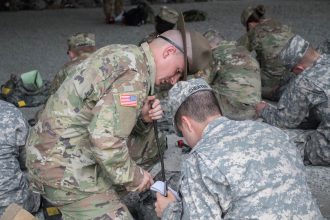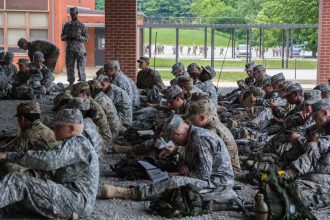Many events in life are stressful even when you have all of the details. I’m sure we all know at least one person that needs all of the details before they can decide whether they are going to do something.
Now imagine going into an event with no information to go off of. For some situations, this can turn out alright—but in combat, details are necessary.
What is the enemy wearing? Where are they located? What is the situation that you are dealing with? These are just some of the questions that might get sent or received by a radio operator.

3rd Regiment, Basic Camp work on proper radio protocol during Cadet Summer Training 2018. (Fort Knox, Kentucky, 23 June) Photos by: Jakob Coombes
Cadets from Basic Camp, 3rdRegiment learned how to operate a radio Saturday afternoon. Being able to operate a radio is imperative to the success of some missions.
Radio training for Cadets includes learning the phonetic alphabet, how to hold the radio, and how to send and receive messages.
At the end of the cycle, Cadets will be tested on accurately sending and receiving messages to
one another. This gives Cadets a hands-on experience in radio operating.
Senior Drill Sgt. Brian Moody said, “It is important for them to learn this because each unit has a radio operator and each [Soldier] should know how to operate the radio just in case the radio operator goes down.”

3rd Regiment, Basic Camp work on proper radio protocol during Cadet Summer Training 2018. (Fort Knox, Kentucky, 23 June) Photos by: Jakob Coombes
Cadets are trained in this for around 2-4 hours, but they all receive smartbooks that have helpful tips and information on radios for the future.




